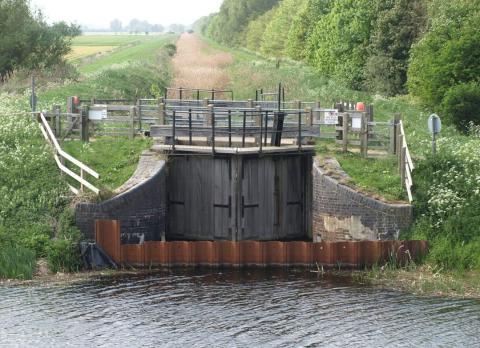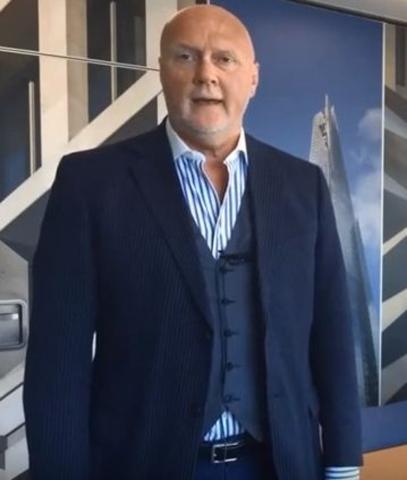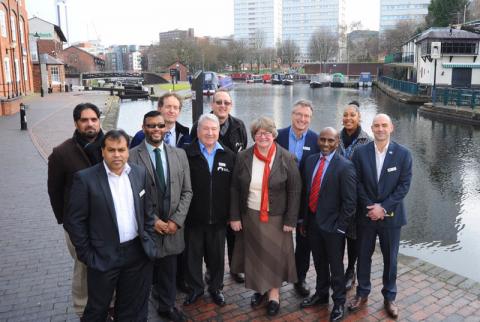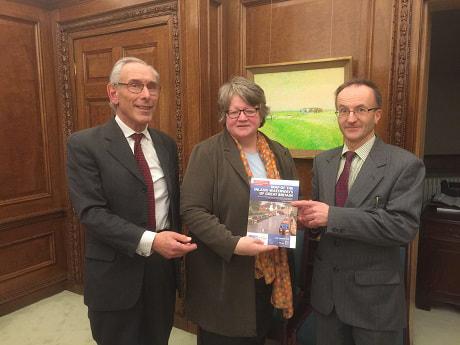We told you so - Floater prediction comes true
April 2018 - Back in January, The Floater made a number of predictions for the New Year and, just four months later we are seeing them come true. Writing about the Environment Agency merger with C&RT, we said 'Defra will drag its heels regarding C&RT's bid to take over EA waterways. Despite the IWA's frantic lobbying, it will eventually kick the idea into touch again on cost grounds. Defra will then refuse to publish C&RT's bid document, in the spirit of secrecy that has become a hallmark of both organisations.' Allan Richards takes a look at progress and finds truth stranger than fiction with a transfer that has been on and off since 2001 – a mere 17 years.
Lets go through the prediction item by item:
1. Defra will drag its heels regarding C&RT's bid to take over EA waterways
It was back in February 2016 that C&RT and EA set up a joint working group to explore options for transfer of EA waterways to C&RT. This appears to have been a speculative venture by the two navigation authorities rather than something sponsored by Defra. In recent years Defra, has paid lip service to such a transfer but always deferred it on the grounds of affordability. As such, much manoeuvring had to be done to get minister Thérèse Coffey to consider any proposal. Eventually, a meeting between the minister and C&RT's chair and chief executive (Allan Leighton and Richard Parry) led to an invitation with a proposal submitted on 17 October 2017.
It took Defra over three months to respond. It took C&RT just a couple of days to issue a press release:
'We are disappointed to report that Defra has indicated that it is not minded to proceed with the transfer of the river navigations currently managed by the Environment Agency to the Canal & River Trust. Having worked positively and collaboratively with the EA over the past 18 months or so to put forward a proposal, we remain convinced that the transfer would be in the wider public interest. It would deliver the real essence of value for taxpayers, and benefits for the users of these waterways whilst securing the long term future of the navigations themselves. We will of course continue to cooperate actively with the EA in the running of our respective navigations to ensure the best possible experience for all river and canal users.'
NABO, who oppose a transfer until such time as C&RT can demonstrate that it is able to maintain its own waterways, were quick to pick up on this. On 30 January they reported:
'On 20 November 2001, the National Association of Boat Owners(NABO) reported a press release confirming that the Government had decided that the Environment Agency (EA) should retain responsibility for navigation on the rivers under its control and not transfer them to British Waterways.
/em>'Some 16 years later, NABO again wrote to MPs that sit on the All Party Parliamentary Group for Waterways, expressing concern and opposition to the Canal and River Trust’s (CRT) proposal to take over responsibility for EA navigations.
'NABO is pleased to learn that in January 2018 the Government has again decided not to proceed with this transfer. Hopefully, both the CRT and EA management teams will now be exclusively focussed on improving the navigations under their control to benefit all users, as recommended by NABO.'
The Floater's prediction was correct. Heels have, indeed, been dragged.
2. Despite the IWA's frantic lobbying, it will eventually kick the idea into touch again on cost grounds.
At face value, the EA transfer football has been kicked into the long grass - yet again! However, C&RT's statement differs substantially from a statement made by IWA that a transfer is still on the cards in the short term.
IWA states: 'At a meeting last week, the Defra Minister with responsibility for the Waterways, Dr Thérèse Coffey, informed IWA representatives that the transfer was still being considered subject to further talks to refine CRT’s proposals. IWA has since received confirmation from Defra that Government remains receptive to a revised proposal from CRT and understands that the Minister has offered a further meeting with CRT.'
Certainly, IWA has been busy lobbying! A short and rather meaningless debate took place in the house of Lords on 8 March (To ask Her Majesty’s Government what is their assessment of the future of United Kingdom inland waterways). A meeting of the All Party Parliamentary Group (APPG) for Waterways on 13 March was not attended by the minister due to other commitments. Minutes or notes for this meeting are 'not available'.
IWA commentary quotes part of Lord Gardiner statement, on behalf of DEFRA, in the the previous House of Lords debate: 'the Minister has instructed officials in DEFRA and the Environment Agency to work with the Trust on a revised proposal which fully accounts for which assets could be transferred.'
It remains to be seen what will happen but one suspects Defra are seeking to run the EA waterways at less cost to the public purse than at present; whilst C&RT will probably have made a proposal which is considerably more expensive with early cash for restoration, ongoing funding and a substantial property dowry.
At the moment it looks as if parties will not reach agreement. Indeed, they may not even be talking to one another. Certainly, an 'unlikely to go ahead' message was given by Richard Parry to C&RT's Council on 21 March.
Longer term,however, the transfer will no doubt surface again. C&RT will come under increasing pressure to take on EA waterways with an insufficient funding package simply to ensure some government funding continues for its ex-BW waterways.
3. Defra will then refuse to publish C&RT's bid document, in the spirit of secrecy that has become a hallmark of both organisations.
Both C&RT and Defra have been asked to provide details of C&RT's transfer proposal. Both have refused.
In C&RT's case, they refused to make information available claiming that it fell outside the scope of the Freedom of Information Act 2000 (i.e. the request did not relate to any statutory functions transferred to it by BW). They also claimed that it was not environmental information and thus outside the scope of Environmental Information Regulations 2004.
Pamela Smith, National Bargee Travellers Association, helpfully pointed out that a previous Freedom of Information response had stated that both EA and C&RT had agreed that a transfer would take place under section 10 of of the British Waterways Act 1983. The powers under Section 10 of the 1983 Act are powers that C&RT inherited from BW and thus fall within the scope of the Act. Based on this information, C&RT was asked to reconsider if the information requested fell within the scope of the Act.
Replying on behalf of the Trust, Andy Glyde, Governance, Assurance & Risk Manager, stated:
'Even if the Act does apply (which I do not accept), under section 36(2) of the Act, the Trust’s duly appointed “qualified person” (Allan Leighton, the Chair of the Trust’s Board of Trustees) is of the opinion that the disclosure of this information would
i) Inhibit the free and frank provision of advice or exchange of views – it would have a “chilling effect” on the exploration of options and exchange of views and deliberation for the transfer between the Trust and Defra, ultimately leading to poorer decision making; and/or
ii) Otherwise prejudice the conduct of the public affairs – it would have a disruptive effect on the Trust and remove the “safe space” to develop ideas away from external interference and distraction on a “live” area of policy discussion
Having received this opinion from the Trust’s qualified person, I have considered the public interest test and concluded that the public interest in withholding the information outweighs the public interest in disclosure. To come to this conclusion, I have taken into account the fact that if and when the terms of the transfer are agreed between Defra and the Trust they will inevitably be subject to some degree of publicity and public scrutiny and it does not, therefore, appear to me that there is an overriding public interest in the disclosure of draft proposals at this early stage of discussions.'
Needless to say, the above statement does not to sit well with C&RT's press release: 'We are disappointed to report that Defra has indicated that it is not minded to proceed with the transfer of the river navigations currently managed by the Environment Agency to the Canal & River Trust.'
If you think that is confusing, read on for a similar request made to Defra on 10 January. After four weeks delay, Defra replied indicating that they needed yet another four weeks to respond:
'The FOIA allows us 20 working days to respond to your request from the date that we received it. However, section 10(3) of the FOIA provides that, where we have to consider the balance of the public interest in relation to a qualified exemption that applies to the requested information, we can extend the 20-working-day time limit for issuing a response until such time as is reasonable in the circumstances.'
Defra went on to say: 'The particular qualified exemption we are considering in relation to your request is section 43 (commercial interests) of the FOIA.' A reply was promised by 7 March.
Section 43(2) exempts information whose disclosure would, or would be likely to, prejudice the commercial interests of any person (an individual, a company, the public authority itself or any other legal entity). However, it is subject to a public interest test. On balance, is it in the public interest to disclose the information or withhold it?
Having delayed for two months Defra eventually replied on 7 March, making no mention of section 43 but refusing to provide the information anyway.
A further month of delay has occurred with Defra failing to respond to a request to review its decision not to provide the information. A complaint has now been made to the Information Commissioner regarding Defra's conduct.
Conclusion
Predicting that Defra would drag its heels on a takeover was a 'no brainer'. Quite simply, Defra just wants to lower the cost burden of EA Waterways on the public purse. Again, predicting that Defra would refuse to divulge C&RT's proposal was an easy prediction to make. The financial disparity between EA's current funding and C&RT's proposal is too embarrassing for them?
That leaves, 'Despite the IWA's frantic lobbying, it will eventually kick the idea into touch again on cost grounds'. If you believe C&RT's initial statement, this particular ball is kicked into touch already. Subsequent statements may simply be due to IWA lobbying?
Perhaps the final word should be left to IWA National Chair, Ivor Caplan. He attended a Canal & River Trust reception on 21st October, just days after the proposal was submitted. He told fellow IWA Trustees: 'the Waterways Minister had shown little enthusiasm for waterway matters including the proposed transfer of Environment Agency navigations'.
Says it all really.
Photos: (1st) Welches Dam lock on the East Aglain waterways, one of many shut because the EA is short of funds, (2nd) Allan Leighton - his meeting with Therese Coffey led to the invitation to C&RT to tender for the EA navigations, (3rd) Therese Coffey and C&RT bigwigs on a rare ministerial visit to a canal - the Tory conference was in Birmingham at the time, (4th) Richard Parry has told his board the merger is 'unlikely to go ahead', (5th) The Waterways minister meets with Ivor Caplan, IWA chair and Neil Edwards, the IWA ceo.










